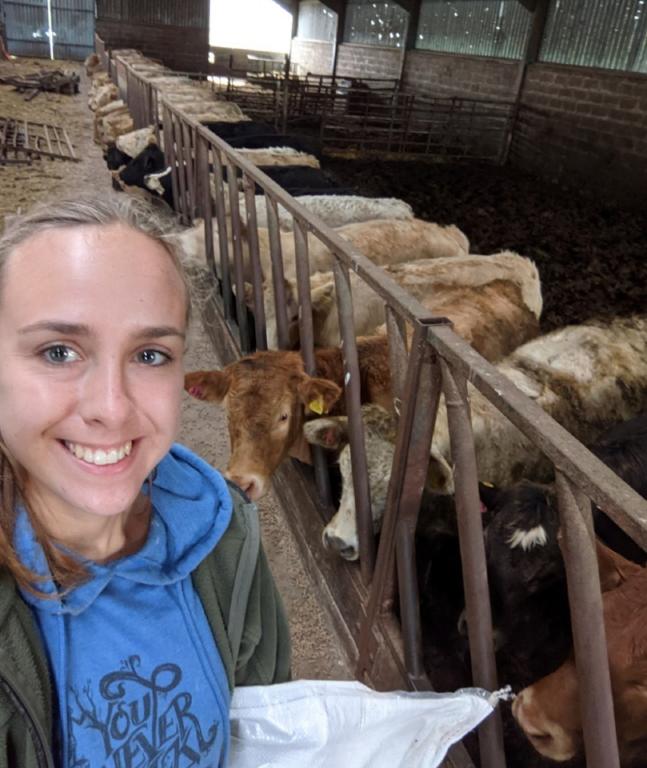I am currently doing a Modern Apprenticeship in agriculture on two mixed farms in East Lothian, working with cattle, sheep, turkeys, and cereal crops.
As well as completing a telescopic forklift course and a first aid at work course with the college that trains me, I have also been able to do a DIY AI course funded by Lantra’s Women in Agriculture scheme. I found the AI one really fascinating as it covered various aspects of cattle fertility, cycling, and improving herd desired qualities.
I believe that by holding these qualifications I will be able to develop my skills and interests further and gaining a permanent position after my apprenticeship in this industry.
Although I’ve previously done a degree in Criminology and Psychology and then a master’s in Public Policy at Stirling University, an apprenticeship is definitely a turning point for me. The opportunity to work full-time, earn a living and gain experience offers a stability and a great feeling of job satisfaction.
I always knew I wanted to do a hands-on job and I enjoyed working outside. However, I didn’t initially consider working on a farm because of my lack of farming background and experience. However, finding out about the pre-apprenticeship scheme made me realise that there are opportunities for new entrants, which is how I eventually managed to get onto an apprenticeship scheme. Being able to talk to various individuals in this sector from dairy to mixed farming made me realise the opportunities this kind of work holds.
Each day can change quite a lot but most recently we had been weaning lambs and calves. It gives us the opportunity to assess all ewes for health problems such as teeth, feet, and udder. Previously, I had helped to clean out cattle courts and get them ready for grain storage as well as, working the tedder and rake during silage.
I’ve been doing lots of jobs on the farm, such as lambing, calving and silage, but look forward to taking on more responsibility and gaining a better understanding of machinery we use; how they work and to fix problems. At the moment I am looking forward to harvest and rearing turkeys as it will all be new to me.
You need to be open-minded, hard-working, and adaptable working on a farm. Weather changes, things break and working with livestock can be challenging; so you need to be able to adapt to these changes if and when they occur. Being open minded to different ideas, solutions and new practices to improve overall working methods and lastly, hard-working defines the often-manual labour you will have to do in your day-to-day job.
The best thing about my job is seeing the progress over time, which offers a great sense of job satisfaction. For example, the fields, working on fields with a power harrow during sowing time then watching the crops grow to harvest.
I enjoy the challenges and new skills I can learn on job; it is definitely character-building.
I’m particularly proud of learning to reverse a tractor trailer! It is definitely a must have skill when clearing cattle courts out and during harvest.
The main challenge I have had to deal with so far is childcare issues as a single parent. The agricultural sector is well known for its long hours, but I have great support from family, which allows me to have a good work-life balance.
There is a lot of technology in farming nowadays, from GPS in tractors to record keeping using smart weigh scales. That allows us to record new calves, cattle movements, medication and it can automatically calculate dosage per weight, promoting better stock management.
Our tractors use AdBlue, which reduces harmful gases being released into the atmosphere. Additionally, we have fields in the Agri-Environmental Climate Scheme (AECS) and plant a wildlife bird seed mix to promote and protect Scotland’s wildlife habitat. There are also benefits of being a mixed farm. Since our cows are kept inside over winter, we can use the dung collected once the livestock are outside on pasture again, to bring back nutrients back into fields. This is cost-effective method compared to chemical fertilisers and is a much more natural system.
East Lothian is very beautiful and many of the local villages have an amazing sense of community.
If I had to convince someone why they should do a job like mine, I would tell them to try it for themselves. I’m sure they would be amazed to see how much they learnt about working on machinery, fencing and husbandry. It might also educate them on where food comes from and how many hours of hard work are involved in producing it.
I would like to combine my master’s degree in Public Policy along with the experience I am gaining in the modern apprenticeship, so I can work on future policies affecting the agricultural sector. However, I would still like to have a hands-on job where I can see how these policies work in place rather than just on paper.
